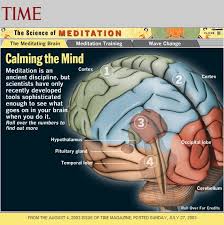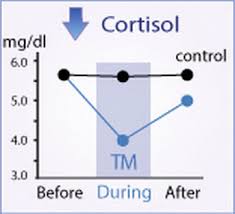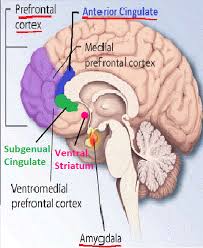This week’s post is by my daughter, Emily Rodgers. She’s a professional writer, editor, and researcher who’s passionate about personal health and wellness including the indisputable value of meditation. Visit Em’s website at FreelanceWriterEmily.com.
 For all those who don’t believe there are scientific benefits of meditation, then feast your brains on this fun fact: Meditation is scientifically proven to help reshape your brain, leading to all kinds of benefits from lower stress, greater focus, high productivity, better health and more happiness.
For all those who don’t believe there are scientific benefits of meditation, then feast your brains on this fun fact: Meditation is scientifically proven to help reshape your brain, leading to all kinds of benefits from lower stress, greater focus, high productivity, better health and more happiness.
Your Brain is a Muscle
Increasingly, neuroscience research draws conclusions the brain is much more like a muscle than medical information previously indicated. Your brain can actually shrink, grow, and reshape itself the more you train it to do—or not do—something.
Meditation is a discipline that contributes to the muscular strength-building of the brain. By training your mind to remain still and silent on a regular and consistent basis, the physiological and mental action creates neuroplasticity in the brain causing it to reshape and expand itself to incorporate this new mental framework.
History of Meditation
 Archeological findings indicate that meditation as a dedicated practice has been around about 5,000 years. It grew as a practice in the South East Asian and Middle Eastern areas eventually becoming a pillar of Chinese Taoist and Indian Buddhist religions.
Archeological findings indicate that meditation as a dedicated practice has been around about 5,000 years. It grew as a practice in the South East Asian and Middle Eastern areas eventually becoming a pillar of Chinese Taoist and Indian Buddhist religions.
Meditation has evolved over time to include a number of variations that incorporate mindfulness, deep breathing, as well as controlled physical movements such as in yoga. Today there are countless subtypes of the practice ranging from concentrated meditation, to open awareness, to guided meditation.
“Sleep is the best meditation” – The Dalai Lama
Scientific Benefits of Meditation
Though anyone who practices meditation and has done so for any dedicated length of time will attest to its many benefits, sometimes these accounts aren’t enough at face value. Luckily science has intervened in the debate and provided some compelling supportive evidence. Click Here.
Here are three scientific benefits of meditation to help achievement oriented people live a better quality of life. There are plenty more scientifically backed benefits which you can read more about. Click Here.
1. Meditation Lowers Stress
 One of the most important scientific benefits of meditation in today’s society is the fact that it lowers stress levels. And because stress seems like a relative term, scientists looked at the effect that practicing meditation had on a person’s cortisol levels. Cortisol is the stress hormone that’s released into your body when your brain is faced with “fight or flight” situations.
One of the most important scientific benefits of meditation in today’s society is the fact that it lowers stress levels. And because stress seems like a relative term, scientists looked at the effect that practicing meditation had on a person’s cortisol levels. Cortisol is the stress hormone that’s released into your body when your brain is faced with “fight or flight” situations.
One study measured cortisol levels before and after a four-day meditation practice and found that the hormone had decreased in participants by an average of 20%. Click Here. Over a long term period, this is statistically significant enough that this practice may reduce the risk of conditions caused by stress such as stomach ulcers, migraines, and physiological disorders.
The reason for the reduction in stress levels has to do with the meditative mindset of your brain being the opposite state of “fight or flight”. This is called “relaxation response”. This is the state in which blood pressure lowers, digestion takes place, and rest occurs.
2. Meditation Improves Mental Focus
 Research into willpower and focus alone proves how important the ability to concentrate and remain disciplined is if we want to achieve our goals. Meditation makes it easier for us to focus, thus is a critical support mechanism in achievement and self-actualization.
Research into willpower and focus alone proves how important the ability to concentrate and remain disciplined is if we want to achieve our goals. Meditation makes it easier for us to focus, thus is a critical support mechanism in achievement and self-actualization.
Here’s the science benefit of meditation and mental focus (and stay with me):
 One research study found that in 20 different participants who practiced Insight Meditation, their prefrontal cortex and right anterior insula areas of the brain had a greater thickness than the matched control participants. Click Here.
One research study found that in 20 different participants who practiced Insight Meditation, their prefrontal cortex and right anterior insula areas of the brain had a greater thickness than the matched control participants. Click Here.
The prefrontal cortex and right anterior insula are areas of the brain responsible for attention and sensory processing. This means these particular participants who practiced meditation, had greater neuroplasticity in these parts of their brain. In other words, these parts of the brain had physically altered to become thicker due to their ongoing meditation practices. This allowed them to pay attention longer, resist distractions, and generally apply greater levels of mental focus and concentration.
3. Meditation Improves Physical Health
It may seem counterintuitive that sitting silently can improve physical health but it’s true. One study compared participants who participated in an eight-week clinical meditation training program compared to a control group. Both groups received flu vaccinations.
When tested, the meditators had greater blood count levels of antibodies to the vaccine than did the non-meditators. This research indicated a strong link between the regular practice of meditation and improved immune system function. Click Here.
The Habit of Meditation
 Meditation is a practice, just like guitar playing, knitting, writing or signing. You have to work at it to get better. But, that’s also where all the benefits stem from. The more you practice the more benefits you will see.
Meditation is a practice, just like guitar playing, knitting, writing or signing. You have to work at it to get better. But, that’s also where all the benefits stem from. The more you practice the more benefits you will see.




Meditation is incredibly effective at reducing stress and anxiety. Meditation literally reduces the density of brain tissue associated with anxiety and worrying. If you want your stress levels to plummet, meditation may be the answer. Meditation is like multivitamins for your brain. Good to take it every day.
Almost forgot. Please give your mom a hug from me and wish her Happy Mother’s Day!
Hi, Garry (didn’t want to leave you out). 🙂
Makes perfect sense to me, Emily. It’s not always easy taming the creative mind, but I do believe we need to rest in order to create. Which is why, I’m guessing, we get so many great ideas in the shower or while out for a leisurely stroll.